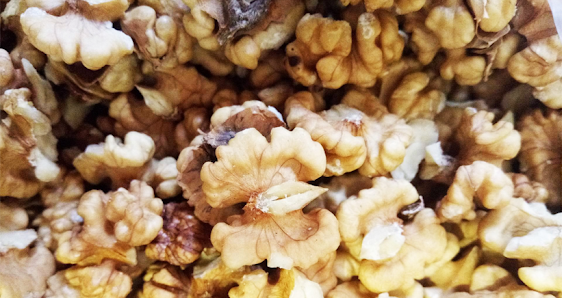Everything You Need to Know About Walnut Health Benefits, Nutrition, And Diet of Walnut and How to Eat and Store Walnut
Everything
You Need to Know About Walnut
Health Benefits, Nutrition, And Diet
of Walnut and How to Eat and Store Walnut
Walnuts are single-seeded, spherical stone fruits produced
by the walnut tree. They're high in beneficial fats, protein, and fibre. They
may improve heart and bone health and aid weight loss, among other things. Here
are 10 Health benefits, nutrition, and diet of walnut
Walnut Nutrition Profile
A serving of walnuts has:
Ø 1.9 grams of fiber
Ø 0.7 grams of sugar
Ø 2.5 grams of monounsaturated fat
Ø 1.7 grams of saturated fat
Ø 3.94 of carbohydrates
Ø 185 calories
Ø 4.3 grams of protein
Health Benefits, Nutrition, And Diet of Walnut
1. Cancers May Be Reduced
Walnuts are high in the polyphenol ellagitannins,
. These can be converted to urolithins by certain intestinal bacteria.
Urolithins may have anti-inflammatory qualities in the gut, which might explain
why walnuts may help prevent colorectal cancer. The anti-inflammatory
properties of urolithins may also assist to protect against other malignancies.
Urolithins also have hormone-like characteristics, allowing them to inhibit
hormone receptors in your body. This may lower your chances of developing
hormone-related malignancies, such as breast and prostate cancers.
2.
Helps
in weight loss
Walnuts are high
in calories; however, studies show that the energy they provide is 21% lower
than what would be predicted based on their components. Furthermore, walnuts
may help you regulate your hunger. Drinking a smoothie made with around 1.75
ounces (48 grammes) of walnuts once a day for five days reduced appetite and hunger
in ten obese persons, compared to a placebo drink with the same calories and
nutrients. Brain scans revealed that after five days of ingesting the walnut
smoothies, the participants' activity in a brain area that helped them resist
extremely enticing food signals like cake and French fries had risen.
3.
Easy
to incorporate into your diet and widely available
Walnuts may be
found at every grocery shop. Check the baking aisle for raw walnuts, the nut
aisle for roasted walnuts, and the specialty oils area for cold-pressed walnut
oil. It's useful to know how to translate the serving sizes used in research so
you can see how yours stack up. Each of the following serves roughly 190
calories and is nearly equivalent: 1 ounce (28 grammes) shelled walnuts = 1/4
cup (12–14 halves) = 1 tiny handful (6). Though it's easiest to eat walnuts one
at a time as a snack, there are many delicious ways to incorporate them into
recipes.
4. Aids in Aging Well
Maintaining mobility and freedom as you age requires adequate physical functioning. Healthy eating habits are one thing that can help you preserve your physical ability. Scientists discovered that individuals with the cleanest diets had a 13 percent decreased incidence of physical impairment in an 18-year observational study of more than 50,000 older women. Walnuts were among the items that contributed the most to a healthy diet. Walnuts, despite their high calorie content, are abundant in vital vitamins, minerals, fibre, lipids, and plant chemicals that may support excellent physical functioning as you age.
5. Heart health
Cardiovascular
health heart disease, often known as cardiovascular disease, refers to a group
of chronic illnesses affecting the heart and blood arteries. Healthy lifestyle practices,
such as consuming nuts, can minimize your risk of heart disease in many
circumstances. Walnuts are no different. Many studies have found that eating
walnuts can help to reduce the risk of heart disease by: LDL cholesterol
reduction (bad) Cholesterol lowers inflammation and improves blood vessel
function.
6.
Keep
bones strong
The mineral copper
is abundant in walnuts. Copper deficiency is linked to decreased bone mineral
density and a higher risk of osteoporosis. Osteoporosis is a disorder in which
bones thin down and become less thick, leaving them more susceptible to
fracture and breakage. More study on the consequences of minor copper
deficiency and the potential advantages of copper supplementation in the
prevention and management of osteoporosis is needed. Copper is also necessary
for the preservation of collagen and elastin, two crucial structural proteins
in the body. The body cannot rebuild damaged connective tissue or the collagen
that makes up the building blocks of bone without enough copper. This can cause
a variety of problems, such as joint dysfunction. Walnuts have a high manganese
content.
How to Eat and Store Walnuts
Walnuts can be
eaten alone or used as a crunchy topping for yoghurt, salad, stir-fries,
vegetable dishes, or ice cream. Choose unsalted walnuts that are raw or
dry-roasted rather than fried in oil for the most heart health advantages. It's
critical to preserve walnuts correctly. They're high in oil, which can turn
rancid if exposed to high temperatures over an extended length of time. The
walnut becomes bitter as a result of this. They should be kept in an airtight
container in a cold, dry location. You may store them for up to 3 months in the
refrigerator or up to a year in the freezer. Walnuts absorb scents, so keep
them away from strong-smelling foods.
Buy online walnut at cheap price on Made In Gilgit Baltistan store







Post a Comment